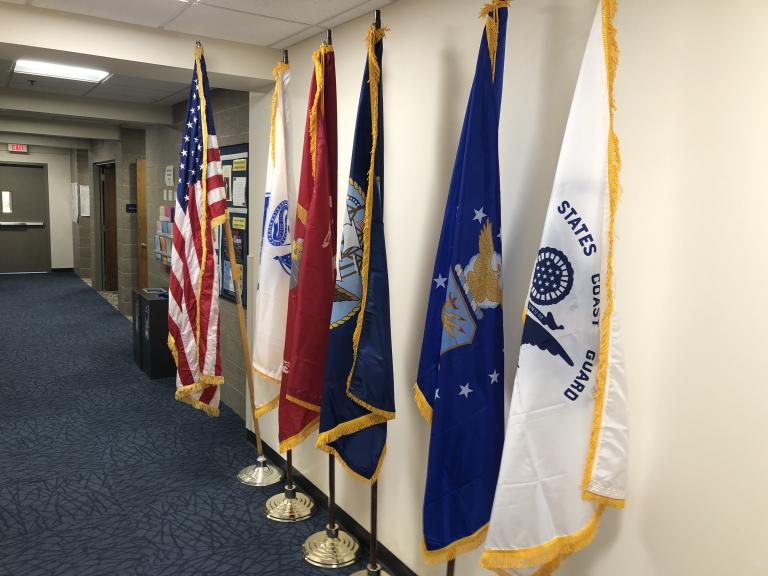I first visited Aisne-Marne seven years ago, while taking a group of students on a January term travel course. The military cemetery in that part of France is the final resting place of over 2,000 Americans who fought during the last year of World War I, their crosses radiating out in arc after graceful arc. Overlooking the cemetery is Belleau Wood, where American marines fought our country’s first pitched action of the Great War. Put together, the two sites are nothing short of haunting.
I don’t remember everything that went through my head that damp, chilly day, but there isn’t the slightest chance that I ever thought to myself that Aisne-Marne was “filled with losers” or that the young men who died at Belleau were “suckers.”
But then I’m not the president of the United States, who reportedly uttered those insults in November 2018, explaining to aides why he couldn’t be troubled to attend a service marking the 100th anniversary of the guns falling silent on the Western Front.
I know it’s hard to keep track of all the cringeworthy things Donald Trump says and does. And I get that it’s easier for his supporters to accuse the rest of us of Trump Derangement Syndrome than to reckon honestly with how dreadful a president and dismaying a person he is.
But I hope against hope that none of us — supporters or critics — forget Jeffrey Goldberg’s shocking report on Trump’s disdain for the military, published just four long weeks ago in The Atlantic.
A lot of other scandals have come to light since then. So in addition to the Belleau/Aisne-Marne story, let me jog your memory with two other lowlights from that article:
- When John McCain died in 2018, Trump not only refused “to support that loser’s funeral,” but was infuriated to see flags lowered to half-staff in the Arizona senator’s honor: “What the f*** are we doing that for?”, the president asked stunned aides. “Guy was a f***ing loser” — a more profane version of what he had said and retweeted in 2015 about the former Navy pilot, who endured torture as a POW during the Vietnam War.
(Last week McCain’s widow, Cindy, endorsed Joe Biden, saying the Democratic nominee “supports the troops and knows what it means for someone who has served.”)
- A year earlier, on Memorial Day, Trump visited Arlington National Cemetery. Stopping at the grave of Marine lieutenant Robert Kelly, killed in Afghanistan in 2010, Trump told the boy’s father — homeland security secretary and former Marine general John Kelly — “I don’t get it. What was in it for them?” Kelly neither denied nor confirmed that exchange, but one of his friends told Goldberg that the president simply “can’t fathom the idea of doing something for someone other than himself.” Goldberg concluded that the commander in chief “finds the notion of military service difficult to understand, and the idea of volunteering to serve especially incomprehensible.”
When I first shared Goldberg’s article on my Facebook page, one reader warned me not to “believe everything you read in the liberal controlled press” — apparently not aware that elements of the report had already been confirmed by the Washington Post (“liberal controlled!”), the Associated Press (“liberal controlled?”), and the national security correspondent for Fox News (“liber– um…”).
Two former sr Trump admin officials confirm .@JeffreyGoldberg reporting that President Trump disparaged veterans and did not want to drive to honor American war dead at Aisne-Marne Cemetery outside Paris.
— Jennifer Griffin (@JenGriffinFNC) September 4, 2020
Another commenter still wasn’t convinced. “This is a lie,” he maintained, then echoed Trump’s repeated claims that he had done more for the military than other presidents.
If so, one wonders why Trump is losing support among servicemen and women themselves. Just before The Atlantic published its article, a Military Times poll found that almost half of active duty military respondents viewed Trump unfavorably — a 15-point swing from the 44% plurality that approved of his performance in 2017. After over 200 retired military officers endorsed Trump’s reelection two weeks ago, nearly 500 national security experts — including retired four-star officers and senior enlisted personnel alike — endorsed Joe Biden, who led Trump by several points in the Military Times poll.
Why the swing? Perhaps it’s because those who actually serve have grown increasingly familiar with the many ways that Donald Trump has disparaged them, or cynically sought to manipulate them to his political advantage. (And now senior officers are reportedly concerned he might try to use them to interfere in November’s election, or to prevent a peaceful transfer of power next January.)
Whatever the reason, the military provides a rare case of a significant shift in opinion about Trump, whose positive and negative numbers have been much less volatile than his presidency. But if soldiers and sailors can decide that he is not the patriotic defender of America’s defenders that he pretends to be, then I wonder if we could see a similar effect among Americans who support the military at least as steadfastly as they back Trump: white evangelicals.

Even before the Supreme Court reentered the national conversation, I’ve been skeptical of recent projections that those religious voters will swing away from Trump this November. More and more, I’ve been persuaded by Kristin’s argument that white evangelical support for Trump is not just a transaction, but the result of a deeper affinity.
Once this underlying affinity between conservative white evangelicals and Trump is understood, it's clear that there's no brainwashing here, that this isn't merely transactional, and that "hypocrisy" misses the point. There is no betrayal of values. They're on the same side. 4/4
— Kristin Du Mez (@kkdumez) September 18, 2020
But as she explains so compellingly in Jesus and John Wayne, that affinity is rooted in evangelical support for the military — and evangelicals’ often militant understanding of masculinity. Even after Vietnam caused many to rethink this country’s foreign policy, white evangelicals “clung fiercely to the belief that America was a Christian nation, that the military was a force for good, and that the strength of the nation depended on a properly ordered, patriarchal home.” Decades later, its response to 9/11 revealed how “evangelicalism had never completely abandoned its Cold War militarism.” As they eagerly supported wars in Afghanistan and Iraq, white evangelicals increasingly used martial metaphors to mobilize the faithful for a “culture war.” Moreover, the military itself became a field for evangelism, with evangelicals accounting for as many as 40% of active duty personnel by one count in 2005.
When such Christians want to see Trump as “a warrior in the tradition (if not the actual physical form) of Mel Gibson’s William Wallace,” it would seem problematic that he derides actual warriors as “losers.” It’s not hard to imagine how evangelicals would respond to a report that a Democratic president had called soldiers “suckers” and scorned them for wasting their lives on national service rather than self-enrichment.
So how can white evangelicals reconcile their ongoing support for Trump with his evident disdain for the people and values of the military?
Most likely, they won’t even try. People of all faiths live with all sorts of cognitive dissonance. It takes little effort to look at the size of the military budget under a president who literally wraps himself in an American flag, and so dismiss as liberal lies the fact-checked, independently-confirmed reporting of an award-winning journalist. Having already chosen to believe that a man who dodged the military draft and publicly demeaned a war hero like John McCain is a reliable defender of military virtue, white evangelicals might not struggle to rationalize away newer evidence of his callous disregard for those who wear this country’s uniform.
But I’m far enough into 2020 not to be surprised by anything. So let’s acknowledge the truth of Kristin’s last line in Jesus and John Wayne: “What was once done might also be undone.”
After all, it wasn’t so long ago that evangelical Christians held more conflicted views of military service. As late as 1952, the National Association of Evangelicals denounced “the militarization of the nation in peacetime.” Even such Christians who weren’t themselves pacifists still fretted about sending their sons into a military culture that they associated with vices like drinking and prostitution. “An army is no school of morals,” the devoutly Baptist president of my university warned the month after Pearl Harbor. “It never was. There will be no end of debasing influences brought to bear on our boys in camp.” (See Anne Loveland’s American Evangelicals and the U.S. Military, 1942-1993 for a study of how those attitudes shifted over time.)
Perhaps evangelicals’ affinity for other aspects of Trump will prove so strong that they’ll even rethink their support of a military that seems increasingly wary of their candidate — a military, I’d add, that has grown more accommodating of religious diversity and more welcoming to women (and, to some degree, gay and lesbian Americans). The military that Donald Trump demeans is also a military that can seem less and less like what the militant men of Jesus and John Wayne want it to be.
But for all that’s happened since 2016, I have a hard time believing that evangelicals would pick Donald Trump over the military itself. So if they don’t ignore or dismiss Trump’s comments about the military, perhaps those words will keep some wavering evangelical voters home in November. Maybe a few will even come to think like former Joint Chiefs chair Colin Powell, a Republican who endorsed Joe Biden in part because he thought the U.S. needs a president who
takes care of our troops and the same way he would his own family… For Joe Biden, that doesn’t need teaching. It comes from the experience he shares with millions of military families, sending his beloved son off to war and praying to God he comes home safe.














